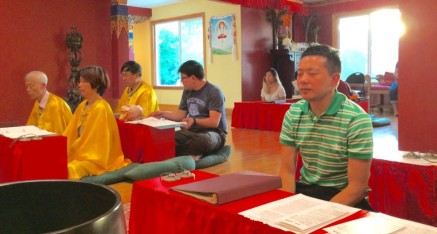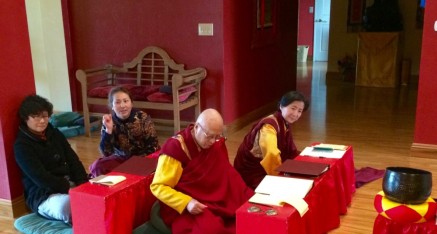After coming to the United States, H.H. Dorje Chang Buddha III gave many discourses to His disciples. In 2000 He gave two very important dharma discourses over a two-day period explaining that “It will be fruitless if one does not listen to discourses in accordance with the dharma expounded in these discourses.” After explaining the many sources of discourses and warning the students to be careful that some dharma lessons are Mara’s teachings and some slander the Buddhas and may lead to devolvement and not accomplishment, His Holiness offered criteria on how to distinguish between the different types and what should be listened to and what should be avoided. His Holiness also offered the following instructions known as the “Seven Dharmas” on how disciples should listen, stressing that once, even several times, are not enough:
STEP #1: The first time you should listen attentively to get the basic concepts.
STEP #2: The second time is to see what you missed the first time and listen to the questions raised by fellow students. You should know the names of the people asking the questions and what questions were raised.
STEP #3: Only after the third time you should grab a notebook and take notes and record some of what you hear. The students who are listening to any discourse given in Chinese that is being translated on the spot and who cannot understand the original Chinese may start taking notes the first time they hear a translation. This dispensation is because it is very difficult for them to even hear a translation once and even then the translation may not be complete or entirely correct. By having notes they can then ask the translator what they did not hear correctly or understand and often the translator will remember more of what the Buddha spoke and explain the meaning of certain obscure Chinese terms, idioms, and historical stories that are not common knowledge to non-Chinese people. However, the translator is not allowed to explain the meaning of the dharma, unless his/her level of realization is very high and he/she has been so certified by the World Buddhism Association Headquarters (WBAH). In fact, only those translators who have provided approved statements as to their qualifications and limitations are allowed to provide translations or even read the written translations of others. This is very important. During this step both Chinese and non-Chinese speakers should grasp the theme of the discourse in detail. Remember when listening to a reading of preliminary translations of these discourses, to consider any translation in light of the “128 Views” from the Supreme and Unsurpassable Mahamudra of Liberation as the translation is probably not completely correct and you can challenge the translation.
You may ask questions after the discourse is finished. If there are others present or you are on a virtual group meeting, observe and record who asks what questions. This is to help you know whom to ask what in the debate. You need to know the names of those participating in the class.
STEP #4: The fourth time, you check your notes and correct what is incorrect and augment them with what you missed. You may and should ask more questions, if needed.
STEP #5: If possible listen a fifth time and discuss your notes with your fellow students, noting who attended the discussion. You may not distribute your notes to other students, but you use them and your discussion to prepare several questions about the content of the discourse. Your questions may be based on items you think you understand or on items you do not know the answer to. You will need at least three questions per discourse. Depending on how many attend, you will probably only get a chance to ask one or two questions per discourse, but others may also ask the same questions, so you will need more questions. If you want to receive credit for the course at LFBCS, you will need to submit these questions to the facilitator for the course. If there will be translation at the debate, you should submit your questions to the translator before the debate.
You should also determine at least one principle from these discourses that you can apply to your daily practice/life.
STEP #6: You debate with other students using your questions. To receive credit for this course you need to ask a specific person at least one question as the Challenger and answer at least one as the Defender. The debate is usually done as part of the seminar, but if time does not permit, it may be held at another time. Participating in a debate is a firm requirement if you are to receive credit for this class. The facilitator must pay attention to this process and keep a record of who is asked and who answers to make sure everyone has an opportunity to participate both as the Defender and as the Challenger.
You should also write a summary of what you learned from this discourse. It is essential that you put your understanding into writing. However, you do not need to submit your summary to LFBCS. It is for your use and only your use. You usually do not share this with others. Steps five and six may be reversed depending on circumstances.
STEP #7: You should also reflect on how you have applied what you learned from this discourse, using the principle that you determined in Step #5. If you take the course for credit, you keep a journal and reflect for a period of time on what you learned each day and record your insights in your journal. You take what you learned from the debate and listening to the discourses and recorded in your journal to prepare your own “talk” in your own words on what you would say to propagate the teachings of this discourse to others. If you are taking the course for credit, you submit your written “talk” to LFBCS. What else you actually do with this will depend on your level of realization and if you have the authority to teach as determined by the examination process monitored by the World Buddhism Association Headquarters (WBAH). This last requirement was not part of the dharma discourse given by His Holiness in 2000, but is true now. However, we can and should talk about our experiences with the dharma and how it perfumes our lives and enables us to help other living beings.
The Buddha Master stated that it is not correctly “listening to the dharma” unless you follow all these seven steps and you may need to listen many more times to complete all seven steps. For some it should be a Twenty-one or more Dharma, not Seven Dharma system. This system enables the disciple to “mine” the dharma discourse in detail for all of its principles, concepts, and sometimes subtle meanings.
FACILITATORS: These are the steps normally followed at LFBCS sponsored on-line classes or at seminars conducted at the Holy Vajrasana Temple or elsewhere. However, other rinpoches and acaryas may follow these steps and even petition the LFBCS to be able to conduct these seminars elsewhere for credit at LFBCS. Anyone wishing to facilitate such a seminar for credit at LFBCS should contact LFBCS for guidance.
The Seminary Program at Learning from Buddha College & Seminary (LFBCS) may sponsor seminars or retreats from time to time to enable non-Chinese students to hear multiple on the spot translations or readings from preliminary translations that are not available in written translations. These classes are usually part of a meditation retreat and are open to both Chinese and English speakers. Those Chinese speakers who prefer to not listen to the simultaneous English translations, listen in one room while the English-speakers and bi-lingual students listen in another. They take notes, revise their notes, and prepare a list of questions. They come together for the debate and discussion that follows.
If the participants choose to take this seminar for credit they will need to follow up with recording each week in a journal how they applied the principles they learned from the discourse(s) in their daily life and cultivation. At the end of the ten or five week course, the students will submit their summaries of what they learned (revised to include their journal experiences, if appropriate) and their written discourse on how they would teach what they learned to others. They will also be asked to take a final exam writing short essays on several questions selected from those asked by the students in steps five or six. They may pick the questions that they themselves asked or others. This process cannot be perfect until we have approved transcripts in both Chinese and English of the discourses and course facilitators with a high enough level of accomplishment to evaluate and grade them. However, until those karmic conditions exist, this is still a worthwhile exercise to gain a better understanding of the principles and concepts that the Buddha teaches and is consistent with the Buddha Master’s teachings.
Those who have participated to date have been most enthusiastic about what they have learned. Until you can explain what you know to others, you don’t really know it.
More on individual classes can be found in the “NEWS” section of this website or at the Learning from Buddha College & Seminary website.
[Revised October 31, 2021] This revision was necessary to reflect the new reality of how English speakers can hear more of the Dharma Discourses offered by H.H. Dorje Chang Buddha III and the creation of the Learning from Buddha College & Seminary (LFBCS). Before COVID we were not allowed to share readings of preliminary translations on the internet. With the advent of ZOOM and our Lemonade Sangha, we developed new skills in virtual classrooms, but we were not totally successful in implementing the above steps. The earlier incarnation of LFBCS as the Xuanfa Five Vidyas University (XFVU) had attempted to follow this method using a series of seminars at the Holy Vajrasana Temple and elsewhere. Now, with the availability of more translations of more of the teachings by the Buddha Master and the improved technology on virtual classrooms, we hope to be able to follow these steps in a more rigorous and consistent manner and have revised the above steps accordingly.
[Revised December 14, 2021] The Buddha Master had been emphasizing the need for all disciples to actively listen to His discourses, but not just in a passive way. We are to listen, understand, and implement what we learn. We will soon be releasing a beta-testing version of some of our classes from the Learning from Buddha College and Seminary (LFBCS) that will enable you to hear preliminary translations of these Dharma Discourses. The first course you must hear is “D01-Buddhism for Beginners, Listening to the Dharma.” It includes “The Supreme and Magnificent Dharma,” which explains why we must listen to Dharma and listen many times. The complete course that will be included in both the Buddhist Studies and Xiuxing Seminary Programs also includes a summary of the discourses that are outlined above. This discourse, provided in the Free program as D01(A), is a prerequisite to be able to listen to any of the preliminary translations that will be provided by LFBCS for those enrolled in any of the LFBCS programs.
Just before He left this world, H.H. Dorje Chang Buddha III started a policy of requiring the Chinese students to wear a very visible sign when they come to the Holy Miracles Temple that gives their name and in quite large letters shows how many discourses they have heard before they are allowed to see the Buddha Master. Listening to discourses and implementing them is a very important part of your cultivation and the core of our course requirements at LFBCS. CLICK for more information about the Learning from Buddha College & Seminary programs.


